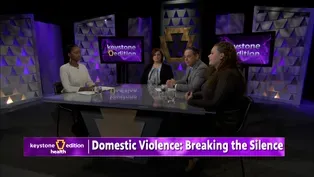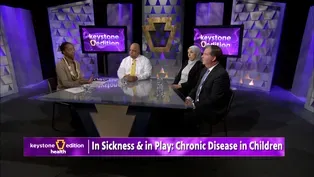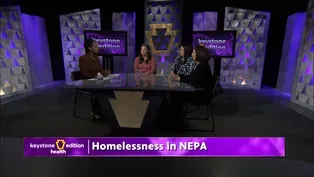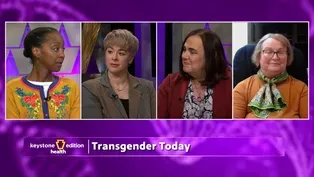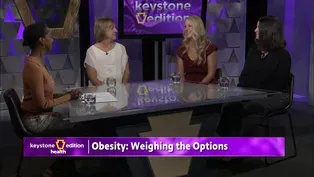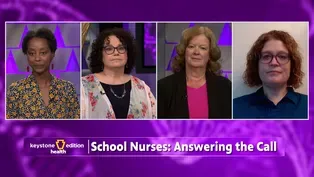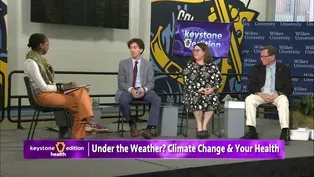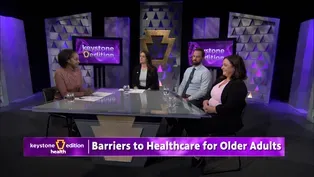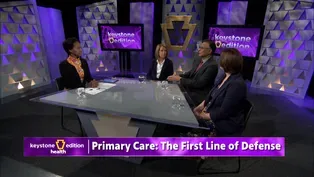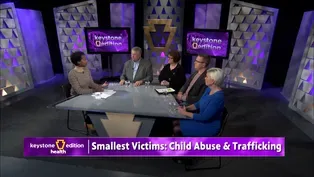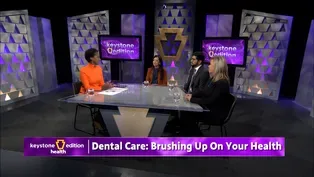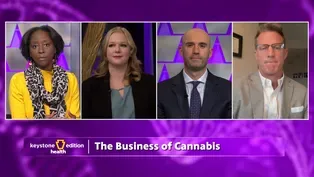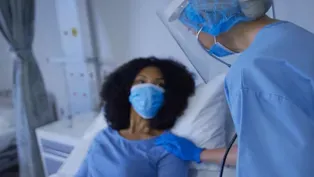Keystone Edition
Trauma-Informed Care
10/25/2021 | 26m 59sVideo has Closed Captions
How can addressing past trauma help people in their present lives?
To care for a person or a patient in the present, you need to understand what has happened in their past. This is the main principle of trauma-informed care, and local experts have been training agencies to adopt this approach. How can addressing past trauma help people in their present lives? Find out on Keystone Edition: Health: Trauma-Informed Care
Problems with Closed Captions? Closed Captioning Feedback
Problems with Closed Captions? Closed Captioning Feedback
Keystone Edition is a local public television program presented by WVIA
Keystone Edition
Trauma-Informed Care
10/25/2021 | 26m 59sVideo has Closed Captions
To care for a person or a patient in the present, you need to understand what has happened in their past. This is the main principle of trauma-informed care, and local experts have been training agencies to adopt this approach. How can addressing past trauma help people in their present lives? Find out on Keystone Edition: Health: Trauma-Informed Care
Problems with Closed Captions? Closed Captioning Feedback
How to Watch Keystone Edition
Keystone Edition is available to stream on pbs.org and the free PBS App, available on iPhone, Apple TV, Android TV, Android smartphones, Amazon Fire TV, Amazon Fire Tablet, Roku, Samsung Smart TV, and Vizio.
Providing Support for PBS.org
Learn Moreabout PBS online sponsorshipMore from This Collection
Domestic Violence: Breaking the Silence
Video has Closed Captions
Access to the right resources can make facing this challenge a little easier for families (26m 59s)
In Sickness and in Play: Chronic Disease in Children
Video has Closed Captions
About 25% of children in the US aged 2 to 8 years have a chronic health condition (27m)
Video has Closed Captions
Homelessness can happen to anyone at any age or socio-economic status. (26m 59s)
Video has Closed Captions
As we raise the visibility on Transgender young adults and embrace them within our culture (26m 59s)
Video has Closed Captions
Obesity is a serious risk factor many try to avoid when developing healthy eating habits. (27m)
School Nurses: Answering the Call
Video has Closed Captions
What can our school districts do to help retain and recruit nurses for future generations? (27m)
Under the Weather? Climate Change & Your Health
Video has Closed Captions
How does climate change impact individual and public health? (54m 59s)
Barriers to Healthcare of Older Adults
Video has Closed Captions
What progress have local organizations made in addressing these challenges? (27m)
Primary Care: The First Line of Defense
Video has Closed Captions
When was the last time you saw your primary care doctor? (27m)
The Smallest Victims: Child Abuse & Trafficking
Video has Closed Captions
What are the signs to know to spot child abuse and even possible trafficking? (27m)
Dental Care: Brushing Up on Your Health
Video has Closed Captions
How can providers make dental care more affordable and accessible? (26m 59s)
Video has Closed Captions
What does the cannabis industry mean for Northeastern and Central Pennsylvania? (26m 59s)
Providing Support for PBS.org
Learn Moreabout PBS online sponsorshipLive from your public media studios wrva presents Keystone addition health a public affairs bro program that goes beyond the headlines to address issues in north eastern and Central Pennsylvania This is Keystone addition health and now moderator tanya Vertitus Good evening and welcome to a new season of Keystone addition health I'm 28 Vertitus Thank you for joining us once again tonight we will discuss how knowledge of past traumas can make for better care in the present have questions call one 800 three to six nine eight for two email Keystone at wpi dawg or use hashtag Keystone health on social media First let's hear from wdia is partly czar in order to care for a person in the present health professionals need to know their patients history but there's a new form of care that focuses beyond a person's medical history to inform treatment options to trauma informed care is a growing movement among social and medical professionals it focuses on respecting responding appropriately to a person's past trauma to avoid re traumatizing an individual and support them in a way that is accessible and appropriate to their past experiences trauma informed care shifts the focus from what is wrong with this person to what has happened to this person and built a strategy of support and care from that answer local agencies like the victims resource center at community care behavioral health organization have begun to take a trauma informed approach with their clients and patience for Keystone Edition health I'm Paul mazar joining us in studio is sarah zach alia license professional care manager with the community care behavioral health organization and lackawanna county assistant district attorney judy price is with us to be a zoo Thank you all for joining us If you have a question for one of our guests call one three to six nine eight four to email at Keystone at wdia dot org or on social media hashtag Keystone health hi how are you Sarah before we jump into what trauma inform care is can you just tell us what trauma is how would you define trauma Oh absolutely So the american psychological association is a reference that i've utilized and they define trauma as an emotional response to a terrible event now that response can be different for everybody across the board one person may respond differently than the other so it's important to her too important to recognize that So those responses can be including It's kind of like a shock to your system the responses can include anything from fear to terror trauma really changes the landscape in our brains in which our brains potentially no longer function the way that they used to So my understanding is there's four types of trauma acute chronic complex and historical Can you tell us a little bit about each Absolutely So acute trauma is kind of like a single event trauma an example a perfect example would be the september 11th attacks So that was just a single event that happened that caused really catastrophic impact for a lot of people chronic trauma is trauma that happens repeatedly over time So when I think of chronic trauma I think often of potential sexual abuse that a person could be experiencing multiple times with that same perpetrator complex trauma get into various types of trauma that could happen to people so similarly a person For example my age thirty seven years old could have multiple trauma as that happens throughout their lifetime leading to reactions that or sometimes hard to diagnose and treat judy right now trauma informed care is a really hot topic we hear the term quite a bit but can you give our viewers some background about governor wolf's trauma plan for Pennsylvania certainly yes in in 2019 governor wolf announced an overhaul of our state services in systems to protect the most vulnerable pennsylvanians here in our state he established office of advocacy and reform to study the services that are needed to protect our vulnerable population One of the key directives from governor wolf at that time was to establish Pennsylvania as a trauma informed healing centered state to better respond to the needs of people who have had adverse childhood experiences or other serious traumatic experiences in late 2019 he named a director for this new office and the director established a trauma informed think bank That was composed of twenty seven members from across to our state from 10 different fields of study to formulate a plan to make Pennsylvania become a trauma informed state last july if twenty twenty governor wolf in the office of advocacy and reform issued their plan and their recommendations it was a comprehensive well study document and he distributed to all 67 counties here in Pennsylvania but the basic premise of his plan is a paradigm shift in the knowledge that perspective perspective and the attitudes of our communities and our organizations to understand with Paul had said at the beginning of this program The real question is not what is wrong with you But rather what happened to you The goal of pennsylvania's trauma informed state then is to our state county local and corporate and educational policies and internal as system systems to recognize understand and address the effects of trauma on the lives of our students are children our families our institutions are employees and our communities at that time when the report was issued a governor wolf challenged all 67 counties in Pennsylvania to commit to becoming trauma informed communities to date About 30 counties including lackawanna county and luzerne county have formed trauma informed county coalitions to study becoming trauma informed communities and when we talk about trauma and form communities What exactly do we mean by trauma informed care well what we're doing here in lackawanna county is to tackle this and we're still trying to wrap our arms around this comprehensive if a challenger and document but what we did is we organized 40 community partners behavioral stakeholders behavioral health partners were invited to participate in a community wide meeting to discuss how we become a trauma informed community here in like a want to county the community partners involved representatives from both the medical and health care community the educational community the law enforcement community nonprofits service providers are county agencies and our behavioral health organizations and so since january of twenty twenty one in lackawanna county what we have done is we have heard from presentations from think tank Members of governor wolf task force in office of advocacy and reform talking to us about how to implement this plan and become a trauma informed of community We've also heard from experts in the field of trauma specialized to talk to us about the levels and the kinds of training trauma training that could be offered to our community partners to assist them in implementing there organizational policies What we are doing here in lackawanna county is number one we have found is that there are many of our community partners in our stakeholders were already offering some form of trauma based training so we're gathering a database of all our community trainings and our stakeholders that are offering trauma training The reason we're doing that as we found that we all want to have one curriculum for trauma based training and speak one universal language so that we can become Speaking of the training I actually was able to participate in a training that you did And sarah Can you talk a little bit about the training there's multiple modules they were very interesting and how that works for providers Absolutely That's it You're right That's how we met each other on by providing training to your organization so trainings that we have utilized include at the very basic levels trauma informed care training such as like what is trauma also How do you respond to people that have been traumatized my favorite training of all is more in terms of self care So for our essentially like ours first responders or medical professionals mental health professionals that are in the field We've been able to train these types of professionals in recognizing something we'll get into later like vicarious trauma and how you can be potentially impacted if you don't practice self care when you're working in the field Now you're talking about first responders we can actually just go ahead and discuss that Now part of the reason I initially spoke to you about training was thinking about physicians and what sorts of trauma They need to be aware of for themselves but if we talk about first responders What are you seeing and what types of training or Yeah absolutely I think that what we're seeing in the field in terms of first responders is It's kind of like an operational hazard in terms of Covid-19 you know our first responders are responding to tragic situations hazardous situations and now there's an additional illness out there that basic terms is killing people So the stress that they face on a daily basis as has exceeded is in terms of providing training certainly in terms of a lot of how we can respond to them and how we can help them and again a lot of it is just education on the potential for recognizing vicarious trauma and themselves and seeking help and supports within their organizations It could be by attending a training It could be by utilizing there Professionals in their field for additional therapy but one of the biggest things that we're seeing is potential the potential for pure support and developing curriculum to train peers in the first responder field whether it be a fiery a mass police because a lot of times we see in trauma people that have been impacted by trauma have kind of lost a sense of safety and have lost a sense of trust So if they can have appeared that is they're familiar with And they could have already have a relationship with that could assist them through that terrible event We've been finding that that's and potentially successful so we are looking into that judy as you're thinking about how your implementing this plan in lackawanna county what would be some guidance that you could give to other counties who might be interested in doing the same thing the governor's plan followed the federal government model tanya but trump informed movement where there is there is for real components and that is realize the widespread impact of trauma recognize the signs respond by integrating this knowledge into your organizational policies and resist re trauma ization in my experience through the lack want to kind of coalition what I think is important is to identify all of your community healthpartners and your state stakeholders that have an interest in integrating trauma inform cure within their institutions within their schools and when their asians the document that governor wolf in his office office of accuracy and reform have have formulated is a great resource for any county that is interested in pursuing a coalition to become a trauma informed community It has a plethora of information and research and resources and ideas as to individualize and specialized trauma training so so my advice would be take a look at the office office of advocacy and reforms document that they presented to the governor wolf Back in july of 20 20 it's a magnificent document fat let's backpack a little dirty dozen mentioned signs of trauma I don't believe that we've talked about that at all So what would someone science be I mean I know they say that we've all experienced some trauma of sought and resiliency is how we respond to things differently but what would sign to be so to get into some of that principles of trauma I think i've already mentioned that trauma really changes are neurological landscape and how our brain functions on a day to day basis so when I think of symptoms of trauma I think of how we can be potentially triggered facing But what we feel is a threat So our sense of of our idea of a threat is certainly changed when we've been traumatized our body responds in in various ways ways when faced with fear Right so trauma kind of make us hyper vigilant to get into those symptoms We could be easily fearful we could again as i've said stated previously we could lose a sense of safety in terms of our ability to trust others and this definitely goes into our day to day relationships with other people and the ability to form healthy relationships so if you're developing trauma informed services It must change the way that you respond to your client So how would you say that being trauma and formed has changed the way that you serve clients For instance I think even throughout what i've learned in trainings and in my in my clinical experience I think the biggest takeaway for me as a concept that Dr bruce perry developed called the three hours how we respond to people we usually if I were if you were in a situation where you were quite upset I might just kind of come over to you Maybe put my hand on your back Try to have try to Have you relax a little bit but I realized what we do on a day to day basis is wrong What I would like to do you know as a trauma informed professional kind of calm down first I'm going to regulate you and then i'm gonna build a relationship with you I'm gonna be late And then after i've i've done those two steps i'm going to reason with you And then I might get you to understand Hey how you were acting potentially you know how that was potentially impacting you and how maybe we could have done it differently if that makes sense Yeah Judy same question for you How is trauma informed care change the way that you're doing service in the justice and juvenile justice system Initially I think from our perspective particularly the juvenile justice system we have realized that they're called ac ease aces adverse childhood experiences are the route of so much of our criminal behavior both an adult and juveniles so what we have begun training and particularly with our law enforcement individuals is to offer what we call de-escalation technique training when you're faced with an individual That is is acting out a particular with students when they become overly aggressive defiant engage in criminal behavior is to train our office personnel are laughing for law enforcement personnel in de-escalation techniques additionally we're offering some cultural sensitivity training we realized that we have a diverse community of individuals from all ethnic social cultural and religious backgrounds and we think it's extremely important important to offer cultural sensitivity training to make our first responders in our law enforcement personnel aware of how to interact with people that come from different backgrounds so that that's our basic premise is to start with those those two techniques as well that that sarah had referred to mentioning the social component that was one of the most interesting modules for me talking about cultural and social different says Can you talk a little bit about the social and racial committee that you've created Sure I can't say that i've read it ok I understand what you're saying i'm I can't say specifically that i've created at by community care has taken an approach to social and racial justice across our organization We're still really in the planning stages of how we're going to respond to our community but what I want our viewers to now is that compassion around this area is at the very heart of what we do We are looking to just increase our overall response to the community and understanding are better members better that have been impacted understanding how to support providers and understanding how to support our staff as well and increased training is is always always a possibility I can definitely say that the community has changed quite a bit here in lackawanna and luzerne county since i've been here judy I know that we talked a little bit about trauma and form care in the context of the community What are you doing Within the coalition to help raise awareness and lack of one You know it's interesting that is one of our major two components in addition to creating a database of the trauma inform trainings that are available in our community we are in consultation with organizations to fund raise public awareness campaign tonia to basically just start the conversation conversation to make people aware of trauma and the basic impact of trauma and that there is help and hope out there for our community We're going to start kind of very small with what we call like an elevator pitch campaign where we just begin to talk about and define in very simplistic terms trauma and you know because when I started on the coalition I think we can all say we took trauma for granted and we never analyzed how traumatic experiences either in our childhood and our daily lives impact our behavior and I have become so knowledgeable about it and have such respect for these certified trauma specialists who are out there in our community to provide education and and workplace strategies for us At this time with the kids clients that you see if you're treating them what they trauma informed approach are you also addressing the family members When I was practicing Yes I would I think a lot of it is on the symptoms and making sure the families kind of up to speed with how the clients doing if they if they were ok with that And what can we do as individuals maybe to support someone that may be experiencing trauma as you said we shouldn't necessarily try and give them my how that might not be the right approach right I think that becoming aware certainly watching specials like today is the first step and even as judy said having the community engage in discussions across the board really trying to take a look through a trauma lens i'm being apathetic as to what an individual may be going through what I would always just educate people on are becoming more aware of the various techniques that can serve trauma and really get at the heart of your emotional response if you're a trauma impacted person Some of those techniques or something called mdr that's pretty popular and highly effective kick it certainly quicker responses then talk therapy can but also having again trauma informed care another popular therapy for people that have been impacted by trauma something called trauma focus cbt judy thinking about the lack of want a coalition recently actually today i'm a part of the loser and counting coalition and we were talking about the types of organizations that are involved but also are there particular types of organizations that you may not have apart as part coalition that you'd like to join or if there was someone out there watching today and they wanted to be a part of the coalition How could they do that Well absolutely they can obviously contact me directly but that's part of our our our data research right now tonia is too to analyze who's missing from our table who's missing from our coalition right now as I said we have a host of behavioral health partners we have education partners school districts We have medical partners we have law enforcement We have community justice programs we aren't we We've identified several components that we feel are missing from our coalition and we'll be reaching out to them very soon to invite them to the table but again we just started to learn this process in january and and we're trying to wrap ourselves around this plan of implementing these trauma inform care within our community so we'd be happy to have any one that feels as though they have something to offer to our coalition there an entity either a provider there There are an organization we would be pleased to have their input and their presence at our coalition table now You said you started in january Would you say that covered exacerbated the for a coalition that one focus on time on foreign care yes the research is telling us that and I think sarah alluded to it as well that the colbert pandemic has had numerous dramatic effect on our school children and adults I know that i'm part of as you are The opium coalition and the use of opioids and methamphetamine and fence and all of heroin has increased dramatically during the pandemic So yes we felt just based on those statistics and the unfortunate after effects of the corbett pandemic of what it did to people that we had to really bump up our knowledge and really start this trauma informed approach and community as soon as practically possible to address what we consider and I think the governor considers a public health crisis at this point Sarah In terms of the models that you've been a part of for the trainings how have organizations responded to the training and also Have you had any one come back and tell you stories about how it's been effective for them I think that the community at large is becoming more aware and I can tell share a personal example between yourself and myself I think that you have taken the trainings they're certainly not my trainings that i've done but i've participated in them and I do feel like i've helped make community and a very large way and having people be more trauma informed and therefore the people that have been been impacted by trauma are getting the services that they need I think it just in general the collaboration has been really impactful I know you and I met again during completing a training and just where we started to where we are today and having this discussion tonight has really gone a long way And i'm very grateful judy Also again to back to these trainings and trauma in foreign care What is your timeline for lackawanna county obviously there's not kind of a Oh we've solved all our problems date but in terms of implementing the plan as I said the public awareness campaign We're hoping to get that off the ground after the first of the year and we are what we have ongoing meetings to analyze our data and then we're hoping to offer countywide training sometime in March of twenty twenty two That is our That was our goal post well the training to be open to anyone Just out of curiosity Well what we've learned in syria maybe you can backing up on this sort of screen is that you know sometimes their special specialized training is available say say law enforcement their special situations that they deal with And so what we have within our coalition is certified trauma specialist who specialize in each entity in each stakeholder so what we're trying to do is a sign a certified trauma specialists to each of the stakeholders in community health partners that we're going to offer the training to say they have some relationship with this entity or this community health partner that the recipients of the training would responsive to so we're trying to assign specialized trainers too specific entities with ann coulter shit Thank you so much I'd like to thank our panelists for participating And thank you for joining us For more information on this topic please visit wdia dot org and remember you can can read watch this episode or any previous episode on demand Meantime online or on the wpa app for Keystone addition health anthony Vertitus and thank you for watching
Providing Support for PBS.org
Learn Moreabout PBS online sponsorshipSupport for PBS provided by:
Keystone Edition is a local public television program presented by WVIA
